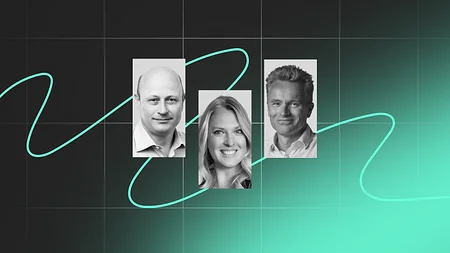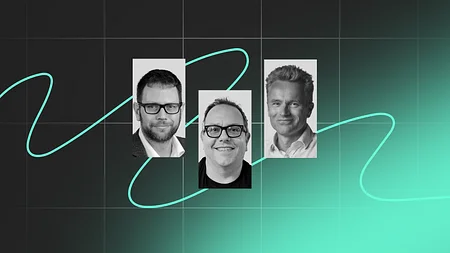Tom Blomfield on Monzo's 1000% growth and taking on the tech giants
Simon Taylor interviewed Tom Blomfield, CEO of Monzo for Fintech Insider.
Listen to the whole interview in full here.
1000% growth in 2017
Monzo went from strength to strength in 2017, from smashing funding round records, garnering praise for weathering the storms of outages eloquently and transparently, to being hailed by Mashable as a by-word for a chat-up line in London’s bars. Now equipped with a banking licence and, in his own words, grown “1000%” in the last year, Tom Blomfield’s Monzo is in a very different place and preparing to get bigger and better in 2018, than when he first appeared on Fintech Insider back in February 2017. Simon Taylor asked the questions to get the inside scoop of what’s coming next for the bank behind those hot coral cards."Last year, we grew over 1000%. We grew 5% week over week."
Prepaid cards to be discontinued
Simon’s first question of the interview involves the much anticipated Monzo current account, and the task of switching loyal prepaid card users over to the new current accounts. 175,000 people Tom tells us, are already using Monzo current accounts, whereas 250,000 had prepaid cards, before Monzo paused sign ups three months ago to focus on the current account. He tells us that the prepaid card will be discontinued as of January or February 2018 with all customers given the option to switch to the current account."We'll be serving notice to wind down the prepaid scheme at some point in January or February...We won't be developing more features for prepaid, it will be going away in the first quarter of next year."In Blomfield’s view 95-99% of customers are happy to make the switch. But what about the rest? In his view they are scared of upgrading to current accounts because of bad experiences with big banks. Monzo’s role is therefore one of education and persuading them that the benefits of the current account are exactly the same as the prepaid: “we're sorry we have to replace your hot coral card with another hot coral card, but, nothing's going to change.” Delivering further on that education piece, the Monzo team will literally call their customers up and engage with them to find out why they don’t want to make the switch, lending a literal human side to their approach and also gathering important market research along the way.
Golden tickets are coming back
Good news for all current account holders, all development and new features will be rolled out to current accounts only. Not only that but Golden Tickets will be making a comeback in Q1 2018.You heard it here first! These were the equivalent of VIP passes for first-in-line access to new features, that was a huge part of Monzo’s low-key marketing and acquisition strategy at its outset.No IPO and no acquisition
Staying with the future, Simon asks what else to Monzo have planned - beyond the current account. Are the IPO rumours true? To the latter the answer is no, and the media news outlets went mad as a result of some “sloppy copywriting” from Tom himself, followed shortly by a job description for a CFO, making them jump to premature conclusions. While the IPO is not completely ruled out, it’s not looking likely any time soon. Likewise, refuting that infamous City AM headline about takeover offers, Tom states plainly that “acquisition is not our goal” and to be acquired would feel like a failure, although it’s not something they can fully rule out, if they were unable to meet their objectives on their own, potentially then acquisition would be the solution, but he hopes not."Acquisition would feel like a failure."
Turning banking products into services
And what are those objectives? That remains unclear, while there is a roadmap of features and services, Tom explains that while the company is growing at 1000% in a year, it’s impossible to properly plan, and they must keep their options open and be reactive. Next up, they discuss profitability: balance sheet lending as a medium-term revenue driver and the longer term marketplace model, changing banking products into services, with a tactical execution to become a customer’s “trusted financial advisor”: "The winning model is a platform or a marketplace. So, as a consumer, you have a set of different financial needs, you have diverse different providers. Maintaining 15 or 20 accounts to manage your money is a pain in the arse, and wouldn't it be nicer if that was all brought in to a single place, to give you visibility and control? So, that's our endgame."Emotional connection
Weaving through the interview is a continued theme that Blomfield keeps coming back to: the conviction that people have a very emotional connection with their money. Customers are driven by behavioural psychology and emotions such as hope, fear, anxiety that overrules logic, and economic factors in their decision making. This is, he explains, something they found out early on in their research and customer feedback from the very start of Monzo, from the first pre-paid card users."There are a couple of things that really were surprising and unbelievably valuable. One is how emotional people's relationship with their money is."This is something they’ve tried to assimilate into their UX, for new features such as Pots, where he argues that the presentation is key to people’s acceptance of a feature, not how sophisticated the tech is that powers it: “It's not hard technology...Customers interact with this presentational stuff, and it really impacts them. So, being able to sweep some of your money aside, has almost as much impact as, literally locking it away. So, if it's not visible to you, you feel like you can't spend it.”
Taking on the tech giants
Simon concluded the interview by asking Tom to picture himself in retirement, 30 years from now - what does Monzo look like? What did it achieve and where did he take it to? Monzo’s mission statement, we’re told, is to build “a powerful financial control centre for a billion people around the world”. Clearly they’re aiming high in terms of scale. Not only that but they want to have a social impact too. Blomfield wants to build a service that “makes people’s finances effortless” and to try and positively impact as many customers as possible as they scale, with the end goal to “leave the world in a better state than we found it”. When asked why it could be Monzo and not the existing tech giants (Google, Apple, Amazon, Facebook) that could create the aggregating platform to manage everyone’s money around the world, Blomfield says that to for the giants to do so would be a “big leap from their core mission”. He picks apart the “sweet spots” that are the ultimate USPs of the big tech companies, and none of them are in the realm of money management: “To be really good at managing your money, I think you need a set of attributes that the big tech companies don't have. [...] Facebook, is really, really good at viral growth, and social. It's good at building huge communities, but relatively low trust, I think. Google is really good at web scale platforms. Gmail, Google Maps, etc. Apple is really good at high-end devices. Amazon is good at selling stuff, really, really, really cheap. None of those are in the sweet spot of the trusted confidante that manages your entire financial life. For any of the tech companies to get there is quite a big leap from their core mission.”"None of those are in the sweet spot of the trusted confidante that manages your entire financial life. For any of the tech companies to get there is quite a big leap from their core mission.”He has a point. He concedes that maybe WeChat might be on their way to doing this already in the East, but could Monzo be the power house to create this for the West, beating Amazon, Google, Facebook and Apple? It’s ambitious. Watch this space.




